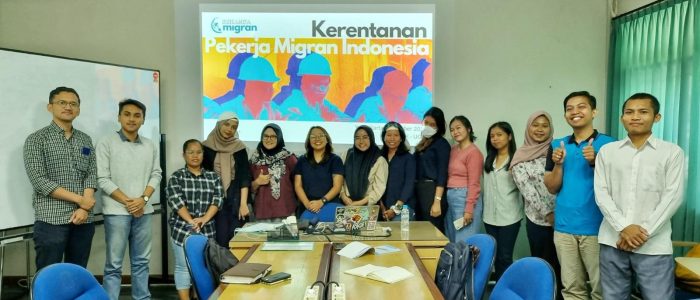
On Tuesday, October 8th 2024, the Peace and Conflict Resolution Studies program at the Graduate School of Universitas Gadjah Mada (MPRK UGM) invited Beranda Migran, a non-governmental organization established in 2022 in Yogyakarta focuses on advocacy for the rights and dignity of Indonesian migrant workers (PMI), to share in the Human Security class, one of the compulsory courses at MPRK UGM. The discussion, held in Room 208, 2nd Floor, Graduate School Building at UGM, was attended by all MPRK students of 2024, as well as Hanindha Kristy, the Director of Beranda Migran, and three of her staff members.
The discussion focused on the vulnerability of human security faced by PMI as Indonesian citizens, especially when they are outside Indonesia’s territory. Hanindha began the discussion with an overview of the history of Indonesian labor migration, followed by the conditions of migrant workers who continue to be exploited and trapped in modern-day slavery. According to Hanindha, PMI are often regarded as heroes for contributing to the country’s foreign exchange, yet they are not treated fairly. Their basic rights and welfare are frequently neglected, as they are exploited through various service provisions, such as logistics delivery, education and training, recruitment agencies, banks, and telecommunications companies.
Furthermore, Hanindha explained that PMI often receives different treatment. Those who leave through government-established procedures are treated well, while those considered to have departed illegally often do not receive the proper services from Indonesian government representatives in the countries where they are located.
MPRK students and Beranda Migran engaged in a deep discussion, raising several cases related to PMI that students had encountered in their hometowns before the class concluded . The many issues faced by PMI make them highly vulnerable to violence, discrimination, and inhumane exploitation. Therefore, advocacy efforts to protect their security, rights, and welfare must continue to be voiced. Equally important, the factors driving individuals to work as PMI, such as poverty and the limited job opportunities provided by the Indonesian government, must also be addressed.
This discussion, organized by MPRK UGM, aligns with the Sustainable Development Goals, particularly Goal 1: No Poverty, Goal 8: Decent Work and Economic Growth, and Goal 16: Peace, Justice, and Strong Institutions.
Writer: Tia Mega Utami
Editor: Arfikah Istari



